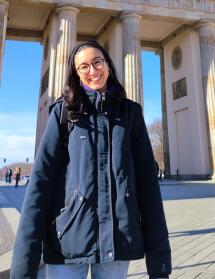
Joined OCC in August 2025

Joined OCC in August 2025
Integration of sleep and feeding with the circadian clock and metabolism in Drosophila melanogaster:
The main objective of this research project is to understand how fruit flies adjust metabolic rate and sleep/wake cycles with the environment and circadian clock. By definition, the metabolic rate is the amount of energy used per unit of time. Therefore, a ‘lethargic’, or sleep state, is associated with a low, and wakefulness with a high metabolic rate. Hence, feeding behaviours, which include hunger-driven locomotion, also lead to an increase of metabolic rate. Furthermore, the metabolic rate is positively correlated with temperature increase. Interestingly, the two daily periods of inactivity, the siesta, which is a postprandial lethargic state, and night sleep, respond in opposite manners to temperature. While warm temperatures disrupt night sleep as expected, siesta sleep improves, suggesting that higher temperatures do not always correlate with higher metabolic rate. Interestingly, we have observed that at warm temperatures flies are more active and eat more in the morning before taking their siesta, compared to colder temperatures. Hence, depending on time of day, flies either increase their metabolic rate via locomotion and feeding (early morning), or fall asleep and reduce their metabolic rate (siesta), indicating a role for the circadian clock. To understand how the circadian clock controls and integrates metabolism with the environment in insects, we will target two aspects of locomotor activity that are tightly linked to the metabolic state of the animal: 1) how hunger-driven locomotion/feeding is controlled and 2) once the insect has eaten, how can siesta sleep improve at warm temperatures.
Prof. Dr. Ralf Stanewsky
Prof. Dr. Christian Wegener
Dr. Anna Ziegler
Huertas Radi, M., Bradlaugh, A.A. and Baines, R.A. (2025) ‘Circadian Rhythms Time Seizure Severity in Drosophila’. Neuroscience. Available at: https://doi.org/10.1101/2025.06.11.659104.
Corke, J., Huertas Radi, M., Landgraf, M., Baines, R.A. (2025) ‘Maturation of GABAergic signalling times the opening of a critical period in Drosophila melanogaster’, bioRxiv, p. 2025.04.24.650400. Available at: https://doi.org/10.1101/2025.04.24.650400.
Huertas Radi, M., Corke, J., Baines, R. A. Seizure Activity Induced by Electroshock in Drosophila Larvae. J. Vis. Exp. (220), e68431, doi:10.3791/68431 (2025).
| *2002 | La Garriga, Catalonia |
| 2020-2024 | Integrated Master of Science in Neuroscience at the University of Manchester, United Kingdom |
| 2024-2025 | Research Assistant in the Baines lab at the University of Manchester, United Kingdom |
| since 2025 |
Beginning of PhD at the University of Münster, Germany |